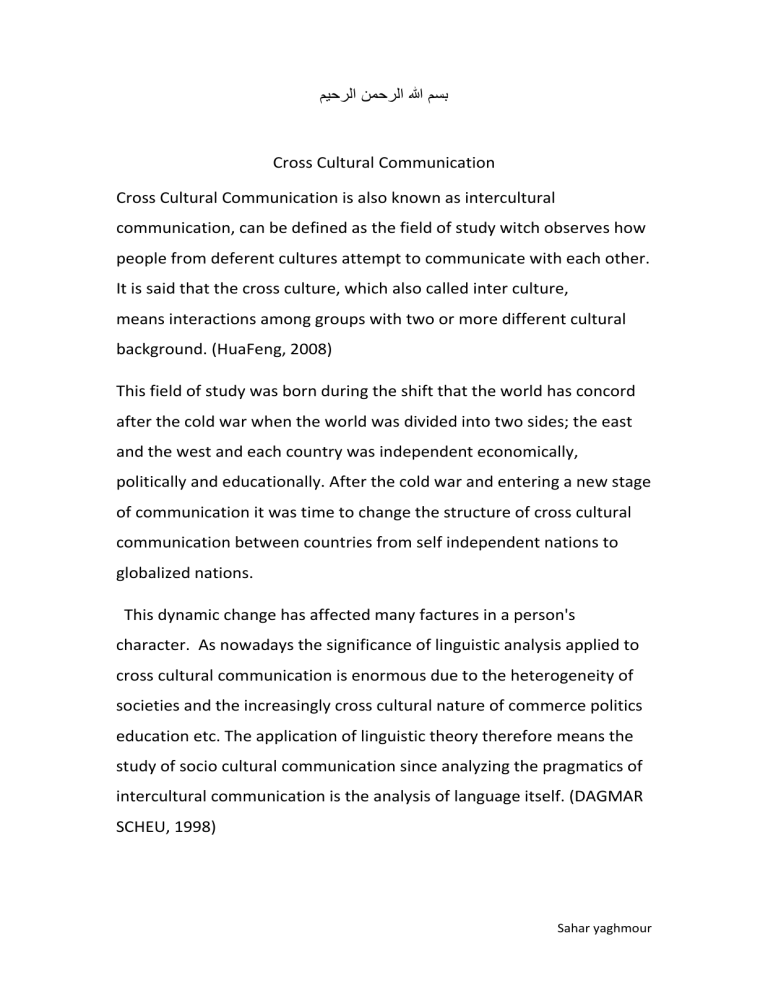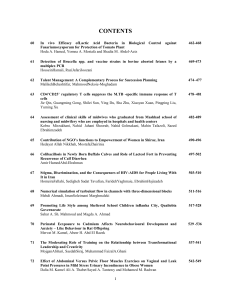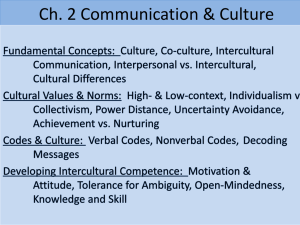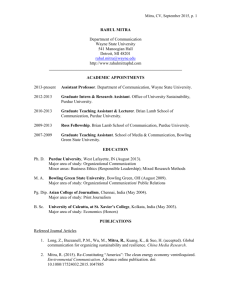References

ميحرلا نمحرلا الله مسب
Cross Cultural Communication
Cross Cultural Communication is also known as intercultural communication, can be defined as the field of study witch observes how people from deferent cultures attempt to communicate with each other.
It is said that the cross culture, which also called inter culture, means interactions among groups with two or more different cultural background. (HuaFeng, 2008)
This field of study was born during the shift that the world has concord after the cold war when the world was divided into two sides; the east and the west and each country was independent economically, politically and educationally. After the cold war and entering a new stage of communication it was time to change the structure of cross cultural communication between countries from self independent nations to globalized nations.
This dynamic change has affected many factures in a person's character. As nowadays the significance of linguistic analysis applied to cross cultural communication is enormous due to the heterogeneity of societies and the increasingly cross cultural nature of commerce politics education etc. The application of linguistic theory therefore means the study of socio cultural communication since analyzing the pragmatics of intercultural communication is the analysis of language itself. (DAGMAR
SCHEU, 1998)
Sahar yaghmour
The understanding of cross cultural communication is very important nowadays specially in the Kingdom of Saudi Arabia because of the increasing numbers of Saudi student studying up road.
As an example with the increase of abroad scholarships in the Kingdom of Saudi Arabia the numbers of Saudi students studying in Australia has increase almost 230% in the last few years (smiles, 2007). In addition
Australia is considered to be a pluralism country. In order for these students to reach their goals they must have good communication skills and the ability to adapt the new culture.
It was for that purpose a necessity for implementing special programs for Saudi students studying up road in order to adapt the new cultures in which they are studying in occurred. As there is some agreement that people feel a sense of uncertainty and anxiety in new environments based upon their lack of cultural knowledge and sense of insecurity. And it results into all kinds of failures since many people couldn't adapt to some new cross cultural environments. (HuaFeng, 2008)
Culture governs the circumstances under which we send and interpret messages. We are socialized, or trained by our culture, to be assertive or modest. Behavior approved of by one culture might be frowned on by another. (Mitra, 2005)
It is important to learn how to collaborate across cultural lines as individuals and as a society. Awareness of cultural differences doesn't have to divide us from each other. It doesn't have to paralyze us either, for fear of not saying the "right thing." In fact, becoming more aware of our cultural differences, as well as exploring our similarities, can help us communicate with each other more effectively. Recognizing where
Sahar yaghmour
cultural differences are at any place (work, school, or shopping) is the first step toward understanding and respecting each other. (Mitra, 2005)
Learning about people's cultures has the potential to give us a mirror image of our own. We have the opportunity to challenge our assumptions about the "right" way of doing things, and consider a variety of approaches. We have a chance to learn new ways to solve problems that we had previously given up on, accepting the difficulties as "just the way things are." (Mitra, 2005)
The most important reason to understand cross cultural communication is to understand how people differ between cultures, and to improve one’s relations with other cultures. Because not understanding different ways of communication will lead to all types of miscommunication which may turn into conflicts between people. In order for a person to communicate better one must be aware of different ways that people communicate, which can enrich our lives. The understanding of People's different communication styles adds deeper views of the world and foundation of their culture. Understanding these views gives us a wider picture of what the world has to give us, and what the world should be like.
Sahar yaghmour
References:
DAGMAR SCHEU, J. M. (1998). AN ANALYSIS OF SOCIOCULTURAL MISCOMMUNICATION.
Intercultural Rel[ Vol 11 , 264-283.
HuaFeng, Y. C. (2008). Cross-cultural Adaptation Management Among. Authorized licensed use limited to: KING ABDUL AZIZ UNIVERSITY. Downloaded on May 18, 2009 at 08:11 from
IEEE Xplore. Restrictions apply. , pp. 2078-2082.
Mitra, B. (2005). The Coming of Age of the Global Citizen-Cross Cultural Communication.
Authorized licensed use limited to: KING ABDUL AZIZ UNIVERSITY. Downloaded on May 18,
2009 at 07:55 from IEEE Xplore. Restrictions apply. , pp. 1-11. smiles, s. (2007, 9 22). theage.com.
Sahar yaghmour










